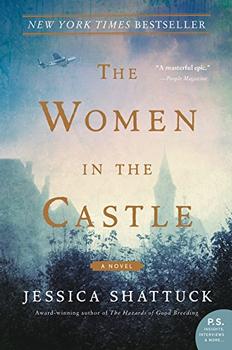Summary | Excerpt | Reading Guide | Discuss | Reviews | Beyond the Book | Readalikes | Genres & Themes | Author Bio

Both ways make your point was Marianne's response. Just pick one. But Albrecht was a deliberator. He did not even notice the irritation in her tone. His own emotions were never complicated or petty. He was the sort of man who contemplated grand abstractions like the Inalienable Rights of Man or the Problems of Democracy while shaving. It rendered him oblivious to everyday things.
Marianne restrained herself to a demonstrative sigh, turned, and left him to his work.
Back in the banquet hall, the countess scolded one of her young disciples from her wheelchair: "Not Schumann," she said, "God forbid! We might as well play Wagner . . . no, something Italian. Something decadent enough to shock any Brownshirt idiot who comes tonight."
Even in her old age, the countess was a rebel, followed at all turns by young artists and socialites. French by birth, German by marriage, she had always been a controversial figure. As a young woman, she had hosted evening salons famous for their impromptu dancing and intellectual arguments on risqué subjects like modern art and French philosophy. Why she had married the proper, fusty old count, a man twenty years her senior and famous for falling asleep at the dinner table, was the subject of much not- very-kind speculation.
For Marianne, who was the product of an oppressively proper Prussian upbringing, the countess had always been an object of admiration. The woman was unafraid to step beyond the role of mother and Hausfrau into the fray of male power and intellectual life. She spoke her own mind and did things her own way. Even from their first meeting years ago, when Marianne was a young university student dating her professor (Albrecht), she had wanted to become a woman like the countess.
"It looks wonderful out there," Marianne said, gesturing toward the courtyard. "Monsieur Pareille is a magician."
"He is an artist, isn't he?" the countess proclaimed.
It was nearly six o'clock. Guests would begin arriving at any moment.
Marianne hurried upstairs to the chilly hall of bedrooms where her girls were holed up in an ancient curtained bed, a relic from the castle's feudal past. Her one-year-old son, Fritz, was at home in Weisslau with his nurse, thank God.
"Mama!" Elisabeth, age six, and Katarina, age four, shrieked with delight. Elfie, their sweet, mild-mannered au pair, glanced up at Marianne with a beleaguered expression.
"Isn't it true that Hitler is going to take back Poland next?" Elisabeth asked, bouncing on the mattress.
"Elisabeth!" Marianne exclaimed. "Where did you get this idea?"
"I heard Herr Zeppel saying it to Papa," she said, still bouncing.
"No," Marianne said. "And why would you think that was any-thing to be excited about? It would mean war!"
"But it's supposed to be ours." Elisabeth pouted, stopping mid-bounce. "And, anyway, Herr Zeppel said the Poles can't manage themselves."
"What nonsense," Marianne said, irritated that Albrecht had allowed the child to hear such talk. Zeppel was the overseer of their estate in Silesia and an ardent Nazi. Albrecht tolerated the man's nonsense because they had grown up together: Weisslau was a small town.
"But it was ours, wasn't it?" Elisabeth insisted. "Before the war?"
"Elisabeth," Marianne said, sighing, "you concern yourself with what is yours, please—and that includes the book you are supposed to be reading with Elfie right now."
The child exasperated Marianne with her endless obsession with possession. She seemed to have absorbed the national sense of aggrievement, as if she, personally, were the victim of some great unfairness. She had so many advantages but always wanted more—a newer dress, a prettier skirt. If she received a bunny, she wanted a dog. If allowed a bonbon, she wanted two. In her mind, the world seemed to lie entirely at her disposal. Marianne, whose upbringing had been characterized by firm parsimony and restraint, was constantly appalled by this demanding, presuming creature she had raised.
Excerpted from The Women in the Castle by Jessica Shattuck. Copyright © 2017 by Jessica Shattuck. Excerpted by permission of William Morrow. All rights reserved. No part of this excerpt may be reproduced or reprinted without permission in writing from the publisher.




A book may be compared to your neighbor...
Click Here to find out who said this, as well as discovering other famous literary quotes!
Your guide toexceptional books
BookBrowse seeks out and recommends the best in contemporary fiction and nonfiction—books that not only engage and entertain but also deepen our understanding of ourselves and the world around us.